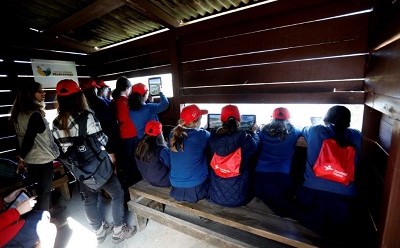- In February, environmental education workshops were held with schools
- For the ninth year in a row, 339 sixth graders from schools in Campo de Gibraltar are taking part in this activity
A total of 339 sixth graders from a dozen schools in Campo de Gibraltar participated in this edition of the training program.
World Wetlands Day has been held on February 2 since 1977 in commemoration of the signing of the Convention on Wetlands in Ramsar (Iran). This was the first treaty for the conservation and sustainable use of wetlands. First Cepsa and later Fundación Cepsa, have played a part in this celebration for the last nine years, running an environmental education program for children from schools in Campo de Gibraltar. Pupils participate in fun, educational workshops to learn about the importance of this type of natural spaces and the Madrevieja Environmental Station; the children are also invited to take part in a competition by submitting their drawings and photographs of the surroundings.
The Sagrado Corazón School in Puente Mayorga (San Roque) was the first to participate in this conference held this year at the slogan "Revitalize and Restore the Degraded Wetlands" in order to raise awareness about the importance of valuing caring for these natural spaces. The Puertoblanco School (Algeciras) closed out this edition of the Fundación Cepsa's Wetlands Conference.
Estrella Blanco, head of Fundación Cepsa in Campo de Gibraltar, said: "Thanks to this program the children have learned firsthand what a wetland is and why conserving them is important. And the Madrevieja Environmental Station is a space rich in biodiversity, refuge for birds, amphibians and mammals in the Campo de Gibraltar."
Since 2014, over 4,000 students from schools across the district have been given the chance to participate in educational activities held at the Madrevieja Environmental Station as part of these environmental workshops.
Madrevieja Environmental Station
In 2009, Cepsa decided to recover and restore this space as part of its policy on biodiversity, sustainability, commitment and respect for the environment, so as to promote nature research and also serve as a space for environmental education which is open to the public. Over ten years after the project started, it continues to grow in importance. It is now led by Fundación Cepsa and is the first of its kind in the province of Cádiz. The richness and diversity of its habitats have made the Madrevieja Environmental Station a true sanctuary for around 130 cataloged species of birds and 21 mammals.

